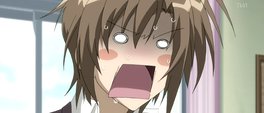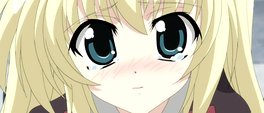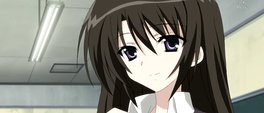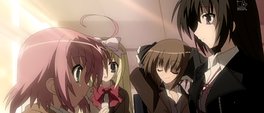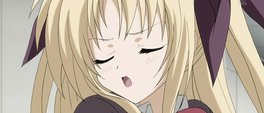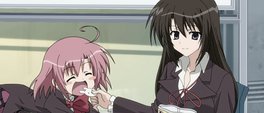Two minutes and twenty seconds from the start of the first episode until the chirrupy opening and nearly fifteen references to other anime are made, an average of one every ten seconds. Breathless to the point of near schizophrenia, the introduction to Seitokai no Ichizon crams in references to popular websites, itself, fandom, and is almost disparaging of its own existence. Hitting the ground with wheels spinning the first episode is raucous and laugh-out-loud hilarious to the point where one's jaw aches and mind reels with the barrage of anime culture references. That it slows down in the succeeding two episodes is a blessing although the threat of stagnation looms large.
The Hekiyou School Council members are drafted in based on popularity which means the density of "cute" girls is high and the presence of a male all the more shocking - Sugisaki saw an opportunity to go for a harem ending (his words) and dragged his test scores from last to first in order to get an assured seat. The result is a chaotic group that takes pleasure in the act of doing very little while trading barbs and succumbing to their own vices. From the diminutive council leader, Sakurano, with a penchant for rabbit-shaped sweets to the icy cold Akaba with untold mental powers it's an oddball group who's chemistry tends to simmer rather than pop.
Sugisaki is undoubtedly the star, starting with innocuous gibes at the president to his constant insistence that the council is his personal cadre of ladies. It's a smart move to make while the other, more long-term characters warm up and being to play off one another. His antics do begin to grate with a strong push to paint him as a kind of martyr figure: eager to please those around him despite their rejections and supposedly wise beyond his years. This is poignancy by contrast as is so often the case with comedies, the sombre moments resonate all the stronger when juxtaposed against irreverence; however these insights fall short of any real depth and feel forced, especially when a single episode later the maelstrom continues with him at the centre.
It is characters such as Sakurano, the peppy council president, and Lilicia, the catty head of the journalism club, which come off best with a more subtle approach used to complement rather than contrast the humour. For its part, the guffaws continue into the third episode, but the external references thin out or obscure themselves entirely and the comedy is relegated to bemusing situations rather than continuous Excel Saga-esque parodies. As with any humour, its worth is measured in its relevance and it is easy to see the series failing to connect with many an audience: the appeal is resolutely specific and relies on a willingness to bear out the inevitable barren patches which favour of plot or character development over slapstick.
Studio Deen does well to keep up the pace of visuals, however with muted hues, head-deforming hair styles and whale-size eyes there's not much they haven't done before especially with character designs as well worn as these - despite having an echo of Happy Lesson to them. Voice actors are mostly unheard of though Mariko Honda playing Sakurano seems to channel every annoying female character that ever lived in an attempt to be more noticeable. Time will tell whether characters such as the Shiina sisters are given more than perfunctory roles and whether the humour can continue as well as it has started out. Easily a divisive show for some, but quality comedy that transcends girls falling over is worth persisting with.

